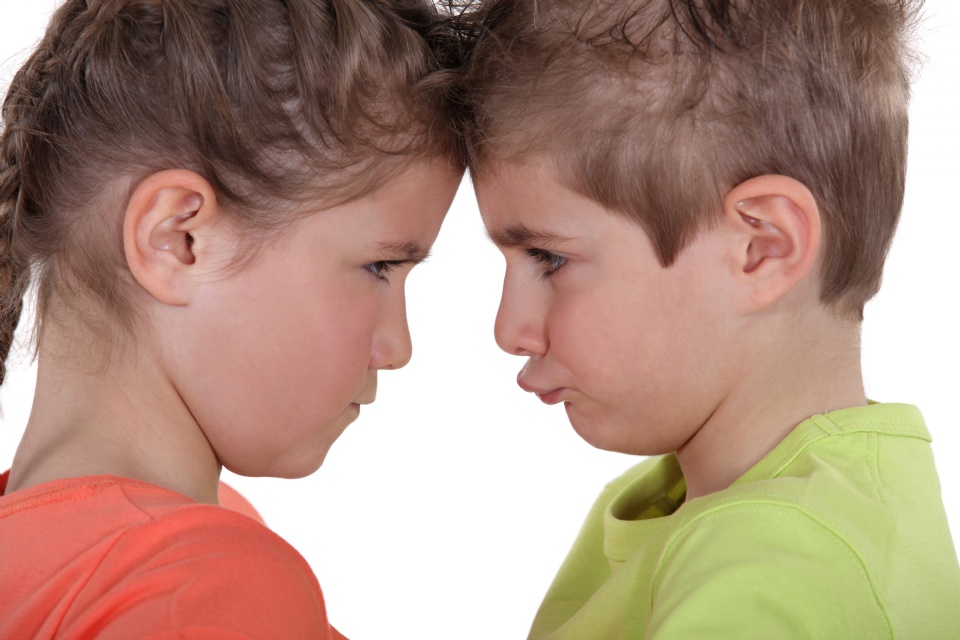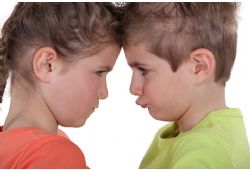In a family of two or more children, what is considered a healthy dynamic? Families of one seem to be blissful. Some children are content to have their parents all to themselves however, in a family of more than one child, children can bully their siblings and there is such a thing as “normal” sibling rivalry. A child’s role in the family can have an impact on whether they feel that they have authority or a social birth right over their siblings.
According to research by early psychologists such as Alfred Adler (1870-1937), birth order significantly impacts the trajectory of psychosocial development and in turn affects sibling relationships. Temperament, developmental needs, role modelling, and parental discipline style are all very important in the evolution of sibling relationships. When a sibling is born, children often feel immediate competition for love and respect of a parent and might act out with aggression and attention-seeking behaviour upon hearing about a newcomer and continue to develop their threat response to the growing sibling.
Tia Maric, MA., MSc., MA., c. o. Licensed Counselor and Therapist at a Laval-area psychology clinic, says some studies show that the older sibling tends to have an innate responsibility over the younger siblings. They often feel the burden of taking on more, and are often deemed to feel the pressure to succeed versus younger siblings. The younger siblings tend to rebel against their parents and older siblings as they view them to be authoritative. The middle child seems to take on the role of the mediator. They often dislike conflict and become people-pleasers. On the other hand, when there is a generation gap, siblings can also feel disconnected socially to their younger siblings and vice versa.
Harmonious living can be achieved in a family of two of more children. Sometimes parents should intervene because there is such thing as unhealthy sibling rivalry. Some children bully their siblings and can be aggressive. Bullying can also be in the form of psychological aggression through discourse and does not necessarily have to be physical. Although sibling conflicts are normal and inevitable, it is important for a responsible adult to take notice and check in on their children’s behaviour toward one another.
Siblings who bully each other can also take on this behaviour at school with their peers. The expression of “one rotten apple spoils the bunch” can apply here. A child who acts out against their siblings on a continuous basis can affect their siblings’ behaviour and attitude. The child who is bullied will often display victimizing behaviour.
Parents should seek help if they feel that their interventions yield no results. Not only is it important to see a therapist or counselor for the child who is struggling to maintain a positive relationship with any of their siblings, but it is also important to seek out a family therapist who can find the root of the problem and evaluate the child’s relationships with their siblings and parents. Every problem can be resolved and sometimes talking it through with an expert can help a family solve their issues and live happily together.

 In The Latest Issue:Latest Issue:
In The Latest Issue:Latest Issue:
- A Bittersweet Farewell
- The new Laval Aquatic Co...
- The End of an Era:
Articles
Calendar
Virtual- ANNUAL TEACHER APPRECIATION CONTEST
- APPUI LAVAL
- ARTS & CULTURE
- CAMPS
- CAR GUIDE
- CCIL
- CENTENNIAL ACADEMY
- CHARITY FUNDRAISING
- CITYTV
- COSMODÔME
- COMMUNITY CONNECTIONS
- COVER STORY
- DINA DIMITRATOS
- ÉCOLE SUPÉRIEURE DE BALLET DU QUÉBEC
- EDITORIALS
- ÉDUCALOI
- EDUCATION
- EMPLOYMENT & ENTREPRENEURSHIP
- FÊTE DE LA FAMILLE
- FÊTE DU QUARTIER SAINT-BRUNO
- FAMILIES
- FESTIVAL LAVAL LAUGHS
- FÊTE DE QUARTIER VAL-DES-BRISES
- FINANCES
- GLI CUMBARE
- GROUPE RENO-EXPERT
- HEALTH & WELL-BEING
- 30 MINUTE HIT
- ANXIETY
- CHILDREN`S HEALTH & WELLNESS
- CLOSE AID
- DENTAL WELLNESS
- EXTREME EVOLUTION SPORTS CENTRE
- FONDATION CITÉ DE LA SANTÉ
- GENERAL
- HEARING HEALTH
- MESSAGES FROM THE HEALTH AGENCY OF CANADA
- MENTAL HEALTH
- SEXUALITY
- SOCIAL INTEGRATION
- SPECIAL NEEDS
- TEENS
- THE NUTRITION CORNER
- THE NUTRITION CORNER - RECIPES
- VACATION DESTINATION
- WOMEN'S FITNESS
- WOMEN'S HEALTH
- HILTON MONTREAL/LAVAL
- HOME & GARDEN
- INTERNATIONAL WOMEN'S DAY
- JAGUAR LAVAL
- LAVAL À VÉLO
- LAVAL FAMILIES TV SHOW
- LAVAL FAMILIES MAGAZINE CARES
- LAVAL URBAN IN NATURE
- LE PARCOURS DES HÉROS
- LES PETITS GOURMETS DANS MA COUR
- LEON'S FURNITURE
- LEONARDO DA VINCI CENTRE
- LFM PREMIERES
- LIFE BALANCE
- M.P. PROFILE
- MISS EDGAR'S AND MISS CRAMP'S SCHOOL
- MISSING CHILDREN'S NETWORK
- NETFOLIE
- NORTH STAR ACADEMY LAVAL
- OUTFRONT MEDIA
- PASSION SOCCER
- PARC DE LA RIVIÈRE-DES-MILLE-ÎLES
- PÂTISSERIE ST-MARTIN
- PIZZERIA LÌOLÀ
- PLACE BELL
- PORTRAITS OF YOUR MNA'S
- ROCKET DE LAVAL
- SACRED HEART SCHOOL
- SCOTIA BANK
- SHERATON LAVAL HOTEL
- SOCIÉTÉ ALZHEIMER LAVAL
- STATION 55
- STL
- SUBARU DE LAVAL
- TECHNOLOGY
- TEDXLAVAL
- TODAY`S LAURENTIANS AND LANAUDIÈRE
- TODAY`S LAVAL
- WARNER MUSIC
- THIS ISSUE
- MOST RECENT
Magazine
Sibling Rivalry: What Is Considered Normal?
Articles ~e 105,7 Rythme FM 4 chemins Annual Teacher Appreciation Contest Appui Laval Arts & Culture Ballet Eddy Toussaint Camps THIS ISSUE MORE...
CONTESTS Enter our contests
CONTESTS Enter our contests
CALENDAR
Events & Activities
COMMUNITY Posts Events
PUBLICATIONS Our Magazine Family Resource Directory
LFM BUSINESS NETWORK Learn more
COUPONS Click to save!
COMMUNITY Posts Events
PUBLICATIONS Our Magazine Family Resource Directory
LFM BUSINESS NETWORK Learn more
COUPONS Click to save!
SUBSCRIPTIONS
Subscribe to the magazine
Un-Subscribe
E-NEWSLETTER Subscribe to our E-newsletter Un-Subscribe
WRITE FOR US Guidelines & Submissions
POLLS Vote today!
E-NEWSLETTER Subscribe to our E-newsletter Un-Subscribe
WRITE FOR US Guidelines & Submissions
POLLS Vote today!
ADVERTISERS
How to & Media guide
Pay your LFM invoice
SUGGESTIONS Reader's Survey Suggest a Listing
LFM About Us Our Mission Giving Back Contact Us
SUGGESTIONS Reader's Survey Suggest a Listing
LFM About Us Our Mission Giving Back Contact Us
 PICK-UP LOCATIONS
Get a copy of LFM!
PICK-UP LOCATIONS
Get a copy of LFM!
TERMS & CONDITIONS Privacy | Terms
ISSN (ONLINE) 2291-1677
ISSN (PRINT) 2291-1677
Website by ZENxDESIGN



 BY:
BY: 
Tweet
Share